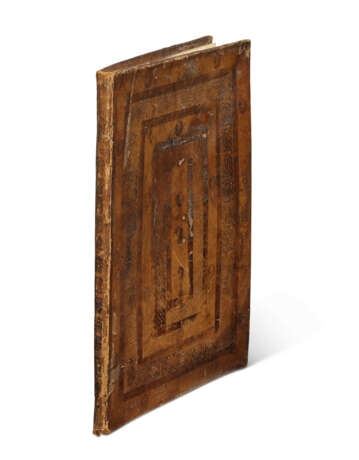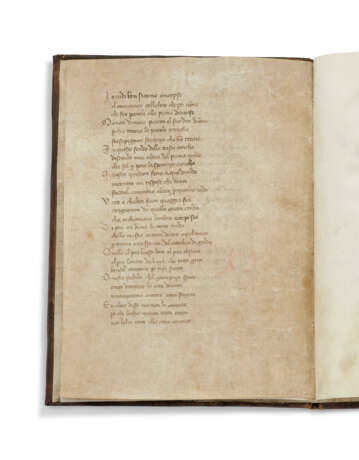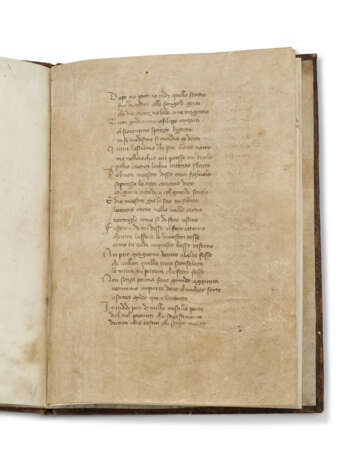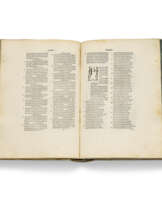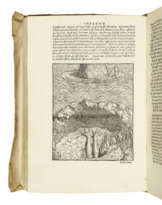ID 1105661
Lot 10 | Dante Alighieri (1265-1321)
Estimate value
£ 60 000 – 90 000
La Divina Commedia, two leaves from Inferno, decorated manuscript on vellum [Florence, mid-14th century]
A remarkable survival from the greatest work of Italian literature: an early fragment from Inferno, in which Dante and Virgil encounter the wrathful soul of Filippo Argenti and approach the demonic city of Dis, from a manuscript belonging to the Florentine 'Cento' group.
c.266 x 200mm. Two consecutive leaves of 27 lines in a Florentine chancery hand, the text from Canto VIII, v.58 to IX, v.36, beginning 'Dopo cio poco io vidi quello stratio' and ending 'Ver l'alta torre alla cima rovente', for a total of 109 verses, second leaf with 3-line initial in red with brown penwork flourishes extending into margin (some fading and smudging to text). 16th-century blind-tooled binding.
Provenance:
(1) Prince Piero Ginori Conti (1865-1939), Italian businessman and politician: his armorial bookplate inside upper cover. Part of Ginori Conti's library was left in his will to the Italian State (including, among other things, a 15th-century Dante once in the collections of Alfonso II of Aragon, illuminated by Francesco Rosselli, now Florence, Biblioteca della Società Dantesca Italiana, MS 3); the remainder was dispersed by his heirs.
(2) Private Swiss Collection.
This rediscovered fragment of the Divina Commedia comes from a dismembered manuscript belonging to the ‘Danti del Cento’ group, an early Florentine production of the Commedia renowned for its uniformity of format, layout, decoration and script. The entire group was once thought to be the work of a single scribe, Francesco di Ser Nardo da Barberino, copyist of Trivulziano Codex 1080, but recent studies have ascribed the production of these manuscripts to several scribes active in the same scriptorium in Florence, likely led by Francesco di ser Nardo himself (on the basis of one of the primary exemplars of the Group being Florence, Codice Laurenziano Pluteo 90 sup. 125, illuminated by Francesco). The expression 'del Cento' derives from an anecdote by the 16th-century philologist Vincenzo Borghini in his Lettera intorno a’ manoscritti antichi (1573), in which he reports that a Florentine scribe was forced to copy for a fee one hundred manuscripts of the Commedia in order to provide his daughters with a dowry: 'e si conta d'uno che con cento Danti ch'egli scrisse, maritò non so quante sue figliuole; e di questo se ne trova ancora qualcuno, che si chiamano "di quei del cento"'. Around sixty manuscripts of the Florentine ‘Cento’ group have survived, mostly written in two columns; while only a small handful of single-column manuscripts are extant. The last fragment to have appeared at auction (Christie's, 14 July 2021, lot 8, sold for £87,500) was a single leaf from a single-column manuscript identifiable with the copyist who wrote fragment II,IV,587a in the Biblioteca Nazionale in Florence.
Cantos VIII and IX of the Divina Commedia present a number of narratological and stylistic firsts. Dante and Virgil traverse the Styx in the boat of the classical guardian Phlegiàs, they have an aggressive encounter in the fifth circle of Hell with the wrathful soul of Florentine magnate Filippo Argenti, and they attempt to enter the infernal city of Dis but are rebuffed by demons. The text here picks up as they leave Filippo Argenti (a nobleman of the Cavicciuoli branch of the Adimari family, whom Dante recognises) - a 'fiorentino spirito bizarro' - to be attacked by other sinners. The subsequent description of the city of Dis constitutes one of the most negative characterisations of Islam in the Commedia: the pilgrim describes a skyline of flaming mosques ('meschite' or, here 'mischite'), and anticipates Dante's negative treatment of Mohammed in Canto XXVIII: 'Ed io maestro gia le sue mischite / la entro certe nella valle cerno / vermigle come se di foco uscite / fossero [...]' ('I can already see distinctly, master, the mosques that gleam within the valley, as crimson as if they had just been drawn out of the fire'). For the first time in the story, Virgil is unable to facilitate access to proceed on the journey, underscoring his limitations as a guide, a key topic in the following Cantos of Inferno. From a narratological perspective, we witness the author's first address to the reader, one of the most significant authorial tropes of the Commedia: 'Pensa lettore se io mi sconfortai / nel suon delle parole maladette / che non credetti ritornarci mai' (vv.94-96); and also the new technique of ending the Canto abruptly, in medias res (on this, see T. Barolini, 'Inferno 8: In Medias Res . . . at the “Secret” Gate of Dis', Commento Baroliniano, Digital Dante, Columbia University Libraries, 2018).
There are a few unusual textual variants (sometimes alternative spellings, sometimes additions, sometimes entirely different words) in our manuscript vis-a-vis both the standard critical edition (the most recent is the 2021 edition by Giorgio Inglese) and other 14th-century witnesses (e.g. Pluteo 26 sin.I). In v.58 we find 'io vidi' where 'io' is omitted elsewhere; v.63 sees 'si mordia co denti' where the modern edition has 'si volgea' (as does Pluteo 26 sin.I; Biblioteca Comunale e dell'Accademia Etrusca, MS 88 has 'si rodea'); v.66 has 'lochio intento' instead of the standard 'intento l'occhio' (MS 88 in the Biblioteca Comunale e dell'Accademia Etrusca has 'attento locchio'); v.93 reads 'che glai scorta' instead of 'scorto l'hai' (Pluteo 26 sin.I has 'che liai scorta' whereas Florence, Biblioteca Nazionale Centrale, Fondo Nazionale II.I. 36 has 'che gli a iscorta'); v.101 has 'et sel passar', like most other 14th-century copies, where the standard edition reads 'e se l'andar'. The scribe of our manuscript omits three verses after v.114, but he draws a manicule and adds them to the margin 'Chiuser le porte que nostri aversari [...]'.
| Address of auction |
CHRISTIE'S 8 King Street, St. James's SW1Y 6QT London United Kingdom | ||||
|---|---|---|---|---|---|
| Preview |
| ||||
| Phone | +44 (0)20 7839 9060 | ||||
| Buyer Premium | see on Website | ||||
| Conditions of purchase | Conditions of purchase |

